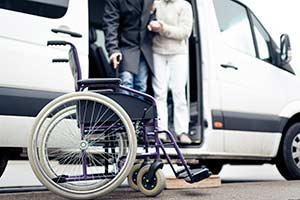AARP Hearing Center

For Interviews, Please Contact:
AARP MD Communications Director
Trésa Ballard
tballard@aarp.org
410-370-5305
January 20, 2015 - A lawsuit filed on Friday, January 16, by Maryland Disability Law Center and AARP Foundation Litigation attorneys on behalf of a proposed class of individuals with disabilities claims that the Maryland Transit Administration (MTA) and the Maryland Department of Transportation are improperly denying eligibility and access to paratransit.
"People need reliable access to paratransit to get to work, life-saving medical appointments, and other critical life activities," said Litigation Director Lauren Young of Maryland Disability Law Center.
The lawsuit claims that the MTA improperly denies eligibility and provides second-class service because MTA’s telephone reservation system can’t answer the calls of all the people who need a ride, in violation of the Americans with Disabilities Act (ADA).
"I need Mobility to stay alive," said named plaintiff Phillip Freeman, who was denied eligibility in 2014 after using the service since 2011. "I can’t live without dialysis treatments three times a week, and I can’t get to dialysis treatments without Mobility." Mobility, otherwise known as paratransit, is the shared ride service the MTA operates to provide public transportation to people with disabilities.
MTA denied eligibility to 51-year-old Mr. Freeman even though MTA’s functional assessment—a test designed to simulate the effort and tasks needed to ride public transit—caused his blood pressure to skyrocket. Although MTA stopped the assessment and called in the paramedics to help Mr. Freeman, MTA denied his application, concluding he can use the regular public transit system.
Baltimore area dialysis centers have also complained about dialysis patients who clearly meet the federal eligibility guidelines unexpectedly being denied eligibility after using the service for years. The lawsuit identified numerous ways in which the MTA fails to properly assess the eligibility of people with a wide range of health conditions and applies eligibility standards that violate the ADA.
"Older people often have no other transportation options," says Julie Nepveu, Sr. Attorney with AARP Foundation Litigation. "Without access to paratransit, older people may become isolated instead of remaining active and engaged in their communities."
The lawsuit also challenges the MTA’s reliance on a phone system that is so inadequate that people can’t reach a reservation agent. People with disabilities report having to wait on hold for over 30 minutes just to schedule a ride or to confirm that a scheduled ride is actually coming when it is already more than 30 minutes late. MTA’s own data shows that over 28 percent of people had to wait on hold for longer than 10 minutes before being helped, if their call can be connected to MTA at all.
The Federal Transit Administration conducted a full compliance review five months ago. The report confirms that the problems raised in the lawsuit are widespread and systemic. The FTA report cited numerous deficiencies that violate the rights of people with disabilities to access paratransit.
The lawsuit seeks to require the MTA to make immediate changes to end their discriminatory practices, because many of the people who are being denied access to paratransit need it to access critical, even life-saving activities.
Attorneys for plaintiffs encourage any paratransit riders who have experienced problems with the Paratransit system to contact Maryland Disability Law Center at CARS@mdlclaw.org or 443-692-2526.































































